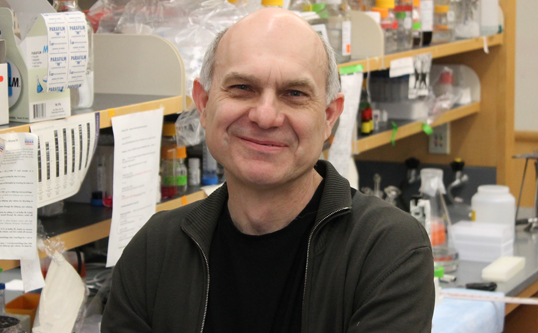
Heinrich Gottlinger, MD, PhD, professor of molecular medicine in the Program in Gene Function and Expression, was named one of three recipients of the 2014 Avant-Garde Award for HIV/AIDS Research by the National Institute on Drug Abuse.
Heinrich Gottlinger, MD, PhD, professor of molecular medicine in the Program in Gene Function and Expression, was named one of three recipients of the 2014 Avant-Garde Award for HIV/AIDS Research by the National Institute on Drug Abuse (NIDA), part of the National Institutes of Health. Dr. Gottlinger will receive $500,000 per year for five years to support his research.
NIDA’s Avant-Garde award competition, now in its seventh year, is intended to stimulate high-impact research that may lead to groundbreaking opportunities for the prevention and treatment of HIV/AIDS in drug abusers.
“This Avant-Garde award is a testament to Dr. Gottlinger’s innovative HIV research,” said Michael R. Green, MD, PhD, Howard Hughes Medical Institute Investigator, the Lambi and Sarah Adams Chair in Genetic Research, professor of molecular medicine and biochemistry & molecular pharmacology, and director of the Program in Gene Function and Expression. “His work promises to enhance our understanding of HIV infection and has the potential to inform innovative strategies for new therapies that could stop cell-to-cell infection.”
Gottlinger’s research will explore the roles of two specific proteins that are involved in HIV’s movement from an infected to an uninfected cell. Because this route of infection allows HIV to evade the immune system’s antibodies, a clearer understanding of this process can inform new strategies to prevent HIV and slow disease progression. Such strategies could be especially relevant for injection drug users, who may be exposed to HIV through sharing syringes that contain infected cells.
“HIV transmission via direct cell-to-cell contact is vastly more efficient than the transmission of cell-free virus, and could contribute substantially to the transmission of HIV by blood contact, as may occur among injection drug users,” said Gottlinger. “The Avant-Garde award provides us with a unique opportunity to explore in detail how certain cellular pathways are exploited by HIV to move from one cell to another so efficiently. We hope that the planned research will yield translational insights into how to block this important mode of transmission and thus benefit all patients infected with HIV, especially substance users.”
Gottlinger joined the Program in Gene Function and Expression at UMMS in 2004. He received his MD from the University of Munich in 1983. From 1984 to 1989 he was a postdoctoral fellow, first at the Institute of Immunology at the University of Munich, and later at the Dana-Farber Cancer Institute in Boston. Before joining UMMS, he was a faculty member in the Department of Pathology at Harvard Medical School. Gottlinger is also the recipient of a National Institutes of Health MERIT (Method to Extend Research in Time) Award.
“These innovative approaches can shed light on mechanisms through which HIV damages or circumvents the immune system, and how these effects interact with those of drugs of abuse,” said NIDA Director Nora D. Volkow, MD. “By learning more about these underlying processes, not only might this research slow the progression and transmission of HIV infection, but it could improve the long-term health of those already infected.”
Jeremy Luban, MD, the David L. Freelander Memorial Professor in HIV/AIDS Research and professor of molecular medicine, was one of three recipients of the 2012 Avant-Garde Award for HIV/AIDS Research.
Related links on UMassMedNow:
Luban lands NIDA Avant-Garde award for HIV/AIDS research